#slav mapping
Text
I still think reading Skaia as a portmanteau of "sky" and "Gaia" is the best way to go, achieving as it does a syzygy of heaven and earth, but it threw me for a loop to discover that "skaia" can show adjectival inflection in Russian nouns, e.g. "russkaia literatura" / "Russian literature"... I guess insofar as Terminator's Skynet (an inspiration for Skaianet Systems) was a sentient nuclear satellite grid, Skaia is linked to Laika and fears of nuclear oblivion even without a linguistic connection to Russia, but it still piques my curiosity.
#Rose quotes Gogol's Dead Souls and John's house is full of Nabokov references...#I wonder if the very mention of Russian writers functions as an ironic Red Scare#homestuck commentary#slav mapping
28 notes
·
View notes
Text
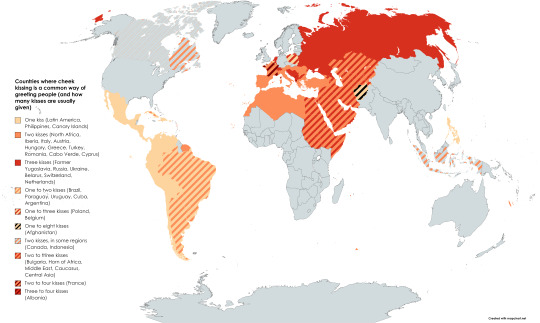
Countries where cheek kissing is a common way of greeting people
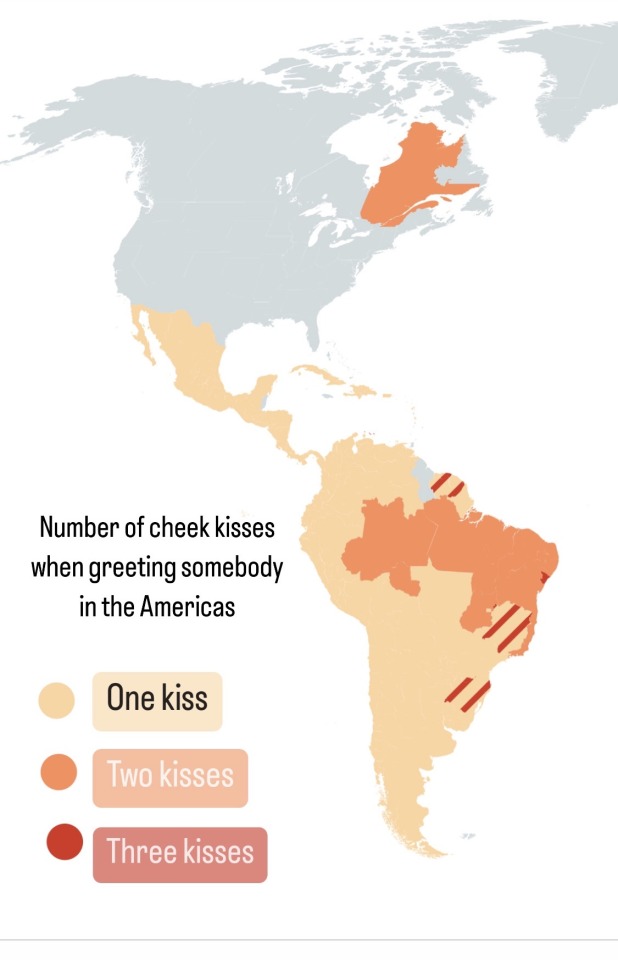
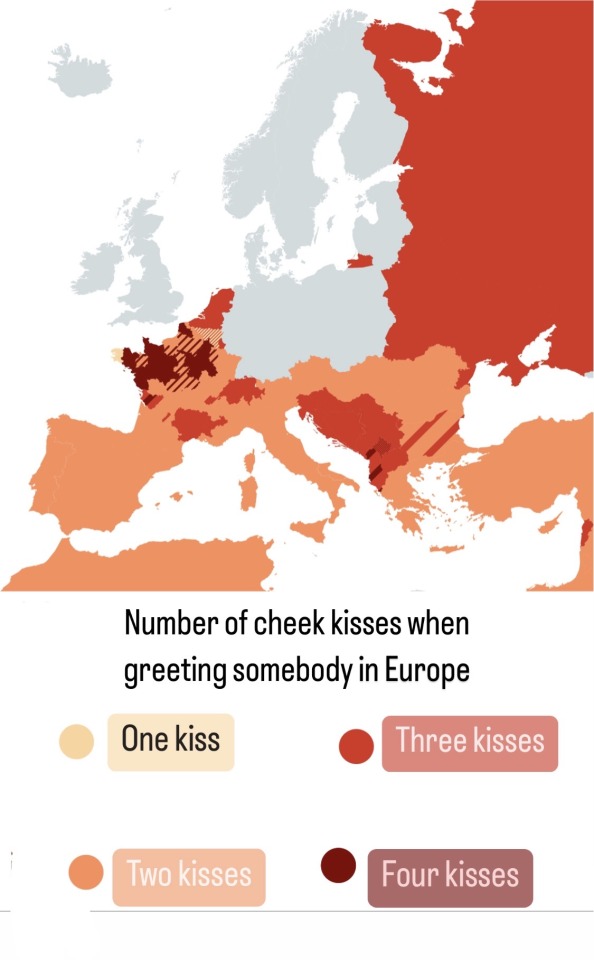
Number of cheek kisses when greeting somebody in the Americas and Europe
#map#maps#world#greeting#kiss#kisses#latin america#latina belt#data#europe#geography#americas#mexico#cartography#russia#eastern europe#slavic#slav#latin#france#french#bise#beso#spain#netherlands#north africa#mena#swana#the philippines
9K notes
·
View notes
Photo

South Slavs in the Balkans and surroundings.
by geomapas.gr
69 notes
·
View notes
Note
Sorry if my question was uncomfortable, but I'm a foreigner and would like to understand more about the "feud" between Greece and North Macedonia. I've seen (heated) discussions between Greeks and Macedonians about culture, but I don't know much about the context. Again, sorry if the question is uncomfortable or insensitive.
I think this Geography Now! video does a good job of explaining the controversy. Basically, the Greek position is that since Slavs came a thousand years after Alexander in the area, and the culture and language of North Macedonians are largely Slavic it's illogical for them to name their country after a Hellenistic kingdom and claim many Greek figures, and also Alexander the Great, as people from their culture.
For clarification, Alexander the Great was certainly Greek and he spoke the Macedonian dialect of Greek which was Doric (for reference the Spartans also spoke the Doric dialect). When North Macedonians say "he was Macedonian" they mean he was from their culture and he spoke their language, and he wasn't Greek.
North Macedonian history tends to confuse the administrative regions with culture and ethnicity because it's convenient to them. It doesn't matter if Kyrillos and Methodios were two Greek brothers from Thessaloniki. To N. Macedonians, because these two brothers were in a region that was occasionally the administrative region of Macedonia, they were "Macedonians", hence "from North Macedonia". To them it doesn't matter that Alexander's birthplace and all important cities of the Hellenistic Macedonian Kingdom are in Greece.
What is crucial to understand about this controversy is that Macedonia for a long, long time, was basically "a geographical region of many mountains". The Greek word Μακεδονία literally means "Mountainous Region", and because it's kind of a distinct region it was a district on its own many times. That's an approximation of the limits of "Macedonia" as a geographical region with distinct characteristics.
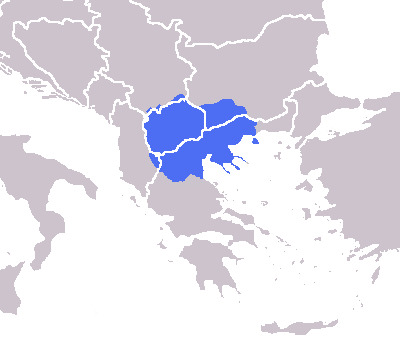
Below is the ancient Greek kingdom of Macedonia. However, the people who are now residents of N. Macedonia won't be here for another thousand years!
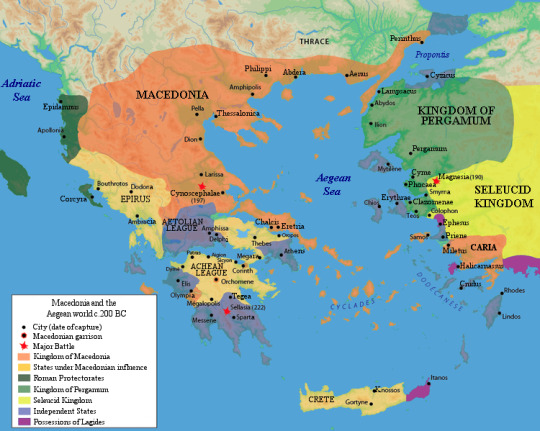
The guy in the video says the Macedonian kingdom expanded, but then he doesn't say that it was separated into more kingdoms for better governance, and one of those kingdoms was this controversial region (in Green) which is now part of Greece and North Macedonia. (Slavs were still not in the area)

When Romans conquered these kingdoms they also separated the area into administrative regions. The province of Macedonia within the Roman Empire, circa 125 (Slavs were still not in the area):
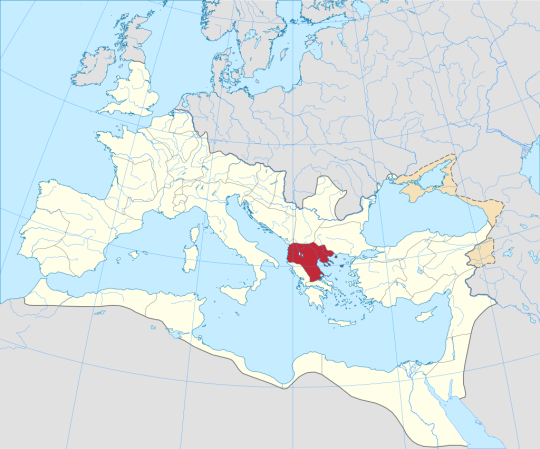
Later administrative departments of Roman empire (Slavs were still not in the area). In fact, "Provincia Macedoniae" changed almost at the time the Slavs arrived, in the 7th century.
Within the Eastern Roman Empire there was later separation into Themata, but now the department of Macedonia was moved to the West, occasionally including parts of the region where N. Macedonia is today. (Slavs in the area after 7th c. ACE)
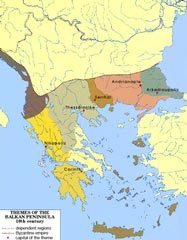
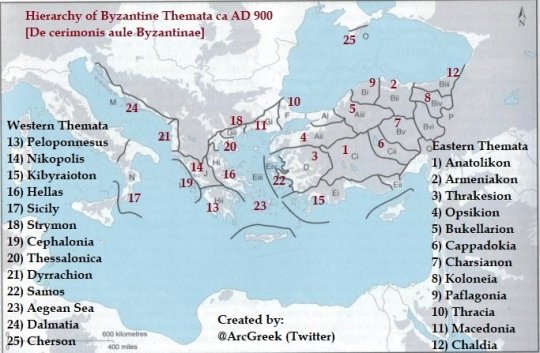

Theeeen came the Turks, and separated the regions differently. Now everyone, Turks, Greeks, Slavs, Hebrews and whoever else lived in that region, are all part of the same "millet", the Rum Millet. "Macedonia" wasn't an administrative area then.
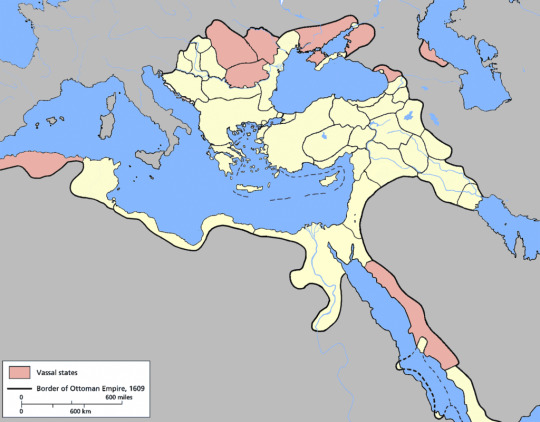
In the 19th century, Turks and Slavs were the majority in the region of Macedonia, with Greeks coming third population-wise, and Hebrews also having very large communities.
(Greeks might not like this fact, or they may ignore it completely, but if you open actual historical books and maps, you'll see the demographics. We have censuses from that era. I learned the old Slavic and Turkic names that villages and places in my region had. There's also a reason Kemal Ataturk's mother wrote to him "They took our Salonik" when Greeks reclaimed the city after 600 years. We can still love our country and appreciate our history, without erasing parts of it.)
In 1912, the largest part of the region of Macedonia was claimed by Greeks. In time more Greeks came to it as immigrants from Anatolia and other Greek regions, shifting the population in such a way that Greeks were now the majority. (North Macedonia still doesn't exist as a country)
In 1991, when the country of North Macedonia was created, Greece already had an administrative region of Macedonia which covered most of the Macedonian geographical area, also the ancient Greek cities of the kingdom, and the emblem of Greek Macedonia was the ancient Greek Macedonian star. The Vergina Star, and the ancient Greek city of Vergina is also in Greek ground today. (Our Emblem and Flag)
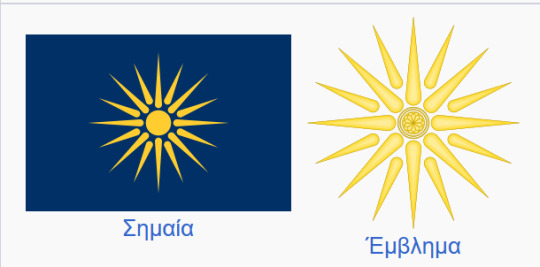
So you can imagine it came as a shock to Greeks when a newly founded country used not only their symbols, but also distinctly Greek symbols. People who are now residents of N. Macedonia lived in the geographical region that a few centuries ago was also "Macedonia" in the administrative sense, so I get where they're coming from. However, when culture gets appropriated, when the culture of important ethnically Greek figures is erased, when Greek words are claimed to be "Macedonian" all of a sudden since 1991, things get tense.
It's a political matter, as the video says. People from the two countries usually have normal interactions if the matter doesn't come up. And I don't think there's hate between the simple people.
#I am not in the mood for a debate I just wanted to explain stuff#make your own post if you want to let off some steam against Greeks :P#answered
67 notes
·
View notes
Note
Hello Professor Reames! How has the Macedonian Question influenced the historiography around Alexander?
The Macedonian Question & Ancient Macedonian Studies
(or, Come study ancient Macedonia! We cause riots!)
I’ll begin by explaining, for those unfamiliar, the “Macedonian Question” centers on who gets to lay claim to the name “Macedonia” and (originally) the geographical region, which is ethnically diverse but majority Slavic. It arose during the First and Second Balkan Wars of 1912-13, then returned after the breakup of Yugoslavia, from 1989 on.
I’ve been a bit chary about replying to this simply because it is (still) a hot topic, if not what it used to be even 10 years ago. Also…expect maps. Let me lead with three points:
1) The ancient Macedonians certainly weren’t Slavic. Slavs didn’t arrive in the area until the 6th century CE (AD), a millennia after Alexander lived. No ancient historian claimed they were Slavs, although some Slavic Nationalists used carefully edited quotes from ancient historians to support their own claims to the ancient Macedonians.
2) A lot of different peoples have passed through the Balkans and northern Greece (and even southern Greece) between now and 2300+ years ago. The Balkans have continued to be an ethnically contested area from antiquity to modernity, and who was “in charge” depended on what century it was.
3) Ancient concepts of Greek ethnicity didn’t ossify until around the Greco-Persian Wars. Prior to that, Greeks were more aware of/concerned with their citizenship/ethnicity in specific city-states (poleis) and/or language family groupings (Ionic-Attic, Doric, Aeolic).
Furthermore, these views were based on MYTH. To be Greek (Hellenic) meant to be descended from the mythical forerunner, Hellen, son of the equally mythical Dukalion (who survived the Flood…e.g., Greek Noah). There were other children of Dukalion, including a daughter Thyia. Thyia became the mother of Makedon, the mythical progenitor of the Macedonians.
So, by ancient criteria, Macedonians weren’t Hellenes (Greek). But they were kissing cousins. The ancients took these things seriously. That’s why I wanted to explain, so when the ancient Greeks said Macedonians weren’t Greeks, it didn’t mean what we’d consider it to mean today.
Back to the Macedonian Question … the issue of the Greekness of the ancient Macedonians got tied up in modern politics when Yugoslavia fell apart. During the First Balkan War and the division of Macedonia in 1913, “Macedonian Studies” didn’t exist yet. By the Third Balkan War (collapse of Yugoslavia), they did. And history was suddenly being pressed into the service of modern political agendas.
Now, let me back up and explain—as briefly as I can (so expect some judicious epitomizing)—the emergence of modern Greece and the First and Second Balkan Wars.
The Ottoman Empire began to collapse (not just decline) in the 1800s, and was essentially kicked out of Europe entirely by the First Balkan War and World War I. The last of it fell apart with the rise of Attaturk and the Young Turk Revolution, so Modern Turkey emerged in 1923.

Greece was part of that. The Greek War of Independence started in 1821, and Greece secured statehood in 1829/30, then became the Kingdom of Greece in 1832/3, which lasted until the military junta abolished it in 1973, after which it became the [Third] Hellenic Republic. From independence until the end of WWII, Greek borders expanded (see map below). Fun detail, the late Prince Philip, Elizabeth II’s husband, was a Greek (and Danish) prince.

The First Balkan War began in 1912, which was the Ottoman’s last gasp in Europe. The Austro-Hungarians wanted to make the Balkans a subject state, Russia wanted more control over the Black Sea, and Greece wanted to push north towards Thessaloniki and “Constantinople” (Istanbul). Ignoring Austro-Hungary, Serbia wanted to reconstitute “Greater Serbia” (14th Century Serbian empire)—which included a good chunk of Greece. And Bulgaria, with the strongest regional army, was eying the whole area south to the sea.

Oh, and let’s add in a dose of religious difference (Muslim vs. Orthodox Christian) just for snorts and giggles.
But this was basically about SEA TRADE access. So, for the three allies against the Ottomans, e.g., Bulgaria, Greece, and Serbia, Thessaloniki, Jewel of the Aegean, was the prize.
The war began October 8th, and by November 8th (1912), the three Balkan allies all hurried their armies to converge on Thessaloniki as the Ottomans withdrew. The Greeks got there mere hours ahead of the Bulgarians.
"Θεσσαλονίκη με κάθε κόστος!" (Thessaloniki, at all costs!) E. Venizelos
The war itself ended the next year (in part thanks to the Greek fleet in Thessaloniki), and Greece kept the city, and with it, still controls a lot of shipping in the Eastern Mediterranean. Shipping remains Greece’s second most profitable industry (after tourism).
Following the war’s conclusion, several issues arose, including how to partition the land—particularly the geographical region of Macedonia. The 1913 Treaty of London split it up between Bulgaria (smallest part), Greece, and Serbia (biggest part). Again, Greece and Serbia wanted to keep Bulgaria, with the most powerful army, from gaining substantially more land.

World War I intervened, and then the rise of Attaturk in Turkey and the “Megali Idea” in Greece. The Megali Idea, proposed at the Paris Peace Conference after WWI (map below), got Greece in trouble. It would have involved retaking not just the islands off Turkey’s coast, but chunks of the Turkish mainland, to match ancient Greek land claims. All THAT led to showdowns, with ongoing human rights abuses on both sides (including the Armenian Genocide earlier, which wasn’t related to Greece).

In 1923, Greece/Hellas and the new Republic of Türkiye agreed to an exchange of populations. So, Ottoman Turks/Muslims in Greece retreated to Turkey (were kicked out), and Greeks in Turkey retreated into Greece (were kicked out). About half those Greek refugees landed in Athens, whose population exploded overnight, creating an economic crisis. Many of the rest ended up in areas of northern Greece, where land from fleeing Muslims was to be had. Ergo, many new immigrants had very strong pro-Hellenic, anti-Muslim/anyone else feeling, and hadn’t been living for ages next to their (Macedonian) Slavic neighbors, who began to feel unwelcome. It also had negative effects on their Jewish neighbors, too. (The loss of Jewish life in WWII in northern Greece, especially Thessaloniki, is both shocking and heartbreaking.)
Keep in mind that the refugees on both sides had been living in their original countries not for a few decades, but for a couple centuries, or even longer in the case of the Greeks in Anatolia/Turkey. The first Greek colonies there date to the 700s/600s… BCE. There’s a good reason the Greeks and Turks hate each other, and it’s not just Cyprus. The atrocities at the beginning of the 20th Century were awful. Neither side has clean hands.
Anyway, there was a second Balkan War in 1913, which I’m ignoring, except for the map below. It amounts to Bulgaria getting pissy about their short shrift in the earlier Macedonian land division.

Then came fallout from World War II, when Greece got the Dodecanese from Italy, et al. But I want to fast forward to the collapse of The Berlin Wall in Eastern Europe, November 9, 1989, and Yugoslavia’s dissolution shortly after. That ushered in the Third Balkan War, or Yugoslav Wars of the 1990s.
Compared to the Bosnian Genocide and other shit going down with Milosevic, the return of the Macedonian Question seems minor. It involved the Yugoslavian province of Macedonia asking to be called “Macedonia” and Greece having a very public, international melt-down.
The entire dust-up confused much of the rest of the world. The number of times I’ve had to explain it to (non-Greek, non-Slavic) people, who just boggled…. I’ve also seen tourists stand in polite perplexity while Greeks went on a hand-waving tear about how Macedonia has been Greek for 4000 years!!! [I’ve got a t-shirt with that on it.] Btw, 4000 years dates before the first Helladic peoples even migrated into the peninsula. Anyway….
Greeks consider the name Macedonia theirs, on historical grounds. They didn’t object to the new country, but wanted it called Skopje, after the capital, or something, anything not “Macedonia.” Meanwhile, the (Slavic) Macedonians were enormously insulted and pointed to the fact they lived in a region called Macedonia, and their ancestors had been living there for centuries, so why couldn’t they call their new country by the name of the region it occupied? Stated fears of actual territorial expansion by either side were largely scare tactics and fringe rhetoric. It really was all about the name. But increasingly, that began to include claims on the ancient Macedonians, or cultural appropriation. The new Macedonian state (FYROM, then) didn’t do itself any favors with their choice of the (ancient) Macedonian sunburst for their flag and naming their airport after Alexander, et al.

That’s how ancient history got sucked into all of this in a way it didn’t the first time.
Now, let me repeat. The ancient Macedonians were not Slavs. The Thracians were not Slavs either, nor the Paionians, nor the Illyrians, nor the Celts north of them. You won’t find the Thracians called “Slavic” in Bulgarian Museums, even while they take very good care of their regional history.
By the 1990s, Macedonian history had emerged as something more than just “Alexander the Great and Philip,” and questions arose about who these people may have been. Were they Greeks like the Thessalians and Epirotes to their south and west? Or were they non-Greeks like the Thracians, Paionians, and Illyrians to their north? This was an academic (not modern political) question, and involved: 1) what did Makedoniste (“to speak in the Macedonian manner”) mean? Was that a dialect or a different language?; and 2) to what degree did ancient Greeks really consider them non-Greeks (e.g., barbarians)? The fact we had so little epigraphy from the area complicated the language question. And ancient Greek politics complicated the second question. Were the angry repudiations by Demosthenes & Friends a real, widely held sentiment…or just ancient Athenian nationalism and anti-Philip propaganda?
This was mostly nerdy stuff that should have remained safely ensconced at dull specialist panels at academic conferences.
Except …. Manolis Andronikos had found the Royal Tombs at Vergina in 1978, and Greece was bursting with pride (as they should have been). Macedonia was back on the map! Tourists still largely stuck to the Greek south, but The Greek Ministry of Culture and Sport saw an opportunity, even back then, to capitalize on tourism, so you can begin to see why it was important for “Macedonia” to remain Greek. Can’t have a country calling itself Macedonia and maybe confusing people about who Alexander and Philip had been, and where they’d lived (and syphoning off possible tourism dollars).
That may sound unduly cynical, but I’m actually with the Greeks on this, even if I’ve always rolled my eyes over the name thing. And, as noted above “Macedonia” was laying active claim to Philip and Alexander as if there was direct continuity between the ancient Macedonians and the modern ones. See below, the giant Alexander statue erected in Skopje (2011), the biggest in the whole city. It’s formal name these days is “Great Warrior,” by agreement with Greece in order to get to call themselves “Northern Macedonia” in NATO. But it’s Alexander.

Like I said, they weren’t doing themselves any favors, although those arguing in their defense liked to point out that Greece had started it, over the name.
Of course the increasingly heated rhetoric around the name, and ownership of Alexander and Philip, enveloped ancient history like the ash cloud from Vesuvius smothered Pompeii and Herculaneum. By the mid-1990s, “middle ground” wasn’t allowed. If one expressed any doubt about the Greekness of the ancient Macedonians, that was heard as, “You’re siding with the Skopjans!” This dispute was still going strong to the point there were riots and protests at the Balkan Studies’ 7th International Symposium on Ancient Macedon in Thessaloniki on October 16, 2002. These protests erupted over the presence of Kate Mortensen, Ernst Badian, and Daniel Ogden, albeit the protests involved different objections for each scholar. Badian, along with Peter Green and Gene Borza (not present), had long been in the crosshairs of the vehement “Macedonia was Greek!” crowd. But poor Kate got targeted because of her paper, “Homosexuality at the Macedonian Court,” and Daniel had the temerity to present about witchcraft at Philip’s court (UnChristian things!). There were some 40 police called in to protect the presenters. You cannot make up this shit.
Btw, by no means were all Greeks, especially not all Greek scholars, hostile to the (largely Anglophone) Macedoniasts who questioned the ethnicity of the ancient Macedonians. Olga Palagia and Gene Borza remained friends and even wrote articles together, but Olga was retired and had a certain freedom from pressure. Manolis Andronikos and Gene also remained friends until Manolis’s death in 1992. But there was an Official Party Line that had to be maintained, or risk losing an academic job or other position in the Ministry. This also got tied into the identity of the occupants of Royal Tombs I and II at Vergina. Greece’s official position is that these are Amyntas III and Philip II, respectively. This is far from a settled matter, however, especially outside Greece.
For more detail from somebody right in the middle of especially the early parts of the quarrel over who’s buried in “Philip’s Tomb” and the ethnicity of the Macedonians, check out Peter Green’s chapter 10, “The Macedonian Connection,” in Classical Bearings.
To return to the question about how it’s affected historiography, other than resulting in hostility towards non-compliant ancient historians (having their work essentially banned in Greece) and the occasional riot at an academic conference (!!), it also resulted in the production of TWO quasi-competing “Companions” to ancient Macedonia at the end of the first decade of the 2000s.
The original proposal (A Companion to Ancient Macedonia, Roisman and Worthington, Wiley-Blackwell, 2010) had meant to include a number of high-profile scholars of both Greek and non-Greek background. But one of those was Loring Danforth (The Macedonian Conflict). When it came out that he was writing the chapter on modern Macedonia, the Greek contributors revolted en masse. (Some were genuinely furious, others had to, to keep their jobs.) Another Companion was put together with Robin Lane Fox at the editorial helm (Brill’s Companion to Ancient Macedon, Brill, 2011), and the Greeks (and a few others) jumped ship. That was a nice break for some younger Macedonian scholars, incidentally, who were then tapped to write chapters for the Roisman/Worthington volume—and very good chapters, I might add. But the end result is one heavily archaeological Companion (Lane Fox) and one heavily historical one (Roisman/Worthington), and which still has Danforth.
Between the arguments of the 1990s and now, however, one important shift has occurred: enough epigraphical data has emerged, and not just later [Hellenistic], to argue the ancient Macedonians did speak a form of Doric Greek. Many/most of us are now a lot more comfortable agreeing that the ancient Macedonians can be called “Greek” without feeling as if we’re selling our academic souls--even if we may still argue that’s not Philip in Royal Tomb II...an identification that some of the younger Greeks also aren’t sold on. And Philip in Tomb II was never the highly charged political issue that the Greekness of the ancient Macedonians was. It just got tied up in it for coming up around the same time. One Greek friend put it succinctly (paraphrased), “It felt like the non-Greeks, especially the Americans and Aussies, were trying to take away Philip and Alexander from us. Tomb II wasn’t Philip, and the Macedonians weren’t even Greeks.”
That may be a bit hyperbolic, but feelings don’t necessarily respond to logic, and Greece would like to have their bona fides.
So, a chunk of the tension from the 1990s has subsided. The Greekness of the ancient Macedonians is largely a non-topic in Macedonian studies today. We’re more interested in new and exciting things like revelations from recent archaeology regarding the sophistication of the Macedonian kingdom well back into the Archaic Age, the real impact of Persia and how early, and what exactly was going on up there before (and after) the Greco-Persian Wars. Or at least, those are certainly my burning questions about the Argead Kingdom up to Philip and Alexander.
#asks#ancient Macedonia#modern Northern Macedonia#Alexander the Great#Philip II of Macedon#Macedonian Question#Bulgaria#Greece#Serbia#ancient Greece#Classics#Ottoman Empire#1923 Exchange of Populations#turkiye#Turkey#Hellenic Republic#Kingdom of Greece
20 notes
·
View notes
Text
So where *is* Tassing, actually?
Obviously it’s nowhere. But actually, it’s also several specific places in a specific area.
As someone who lives and has lived in several parts of Oberbayern, I'm so tickled by placing Tassing on a map. While trying to find a region it would fit in with all the clues the game gives, I also found several monasteries that probably contributed to the way Kiersau was written and created.
Names
Tassing fits a common naming scheme in Oberbayern. Places with an -ing name in Austria and Altbayern (roughly congruent with the present-day administrative districts Upper Bavaria, Lower Bavaria and Upper Palatinate) were founded in a specific time frame, the Baiuvarian Settling of the Alps. Up until the 7th century CE, the alpine landscape was inhabited by slavs, but from the 7th to 9th century, the Baiuvarii, a germanic group of people, moved into the area and ended up either displacing or integrating the slavic people into their own society.
Examples of Baiuvarian -ing names in Upper Bavaria include Pasing (With the people of Paso/Paoso/Poso/Poaso), Menzing (With the people of Menzo) or Poing (With the people of Piuwo). Tassing might have been re-settled, founded or just be associated with a man named Tasso, and should be located somewhere in Altbayern.
Kiersau is a strange name to me and finding an etymologically-based interpretation, like for Tassing, is harder. (In general, trying to find etymologies for place names is often more educated guessing than anything else.) The Bavarian meaning of Au (or Aue) is a flat piece of land with meadows and forests located near a river (also: floodplain). The problematic part is Kiers. I'm choosing to put it down as Kirsche, cherry. Why? Well, cherry trees were brought across the Alps by Romans, and the Roman past of Kiersau and Tassing is important to the story.
It might also just be a reference to Hirsau, a famous Benedictine monastery in the Black Forest.
None of the first or last names of the peasants, merchants or craftsmen in Tassing give any kind of hint as to where the place is located. Names like Bauer (farmer), Gertner (gardener) or Zimmermann (carpenter) are extremely common, and the more uncommon ones, like Alban, don't help narrowing it down either.
Area
We get one look at an Early Modern map of Europe, with a few mountain ranges, rivers, some of the most siginficant trade roads, and Tassing marked on it. We know that Tassing is part of the Prince-Bishopric of Freising in 1518 and borders directly on Tyrolia. We know it's in Bavaria, which I'm deciding to identify as the Bavarian territory of the Holy Roman Empire. I'm not getting into the true borders of Bavaria on my overly researched Pentiment post. We also learn that one of the Roman trade routes, possibly relateed to salt, was built to run past Tassing, and that Tassing is located somewhere in the province of Raetia. To identify and overlap all these areas, I have committed a horrible cartographic crime in Photoshop!
I have marked Raetia in yellow, the Roman roads in red, the Prince-Bishopric in brown and the Bavarian territory in blue. This first map shows these areas in a European context.

This one is a closer shot of the whole possible location of Tassing. Now, you might have noticed a little red dot in the lower right, outside of any of the possible areas, right there in Eastern Tyrolia?

Unfortunately, that is where the Pentiment map placed Tassing. Now, the in-game map is mirroring many a Early modern maps (I'm just glad they put a modern North-South axis on it, ngl), and is. Not Very Reliable. This part of Austria cannot be interpreted as Upper Bavaria by even the most lenient mapreaders, and I am electing to ignore it. Sorry.
I’m also locating Tassing west of Munich, not east, because I’m too familiar with the area around Rosenheim/Wasserburg and I’m just not getting Tassing vibes, even though Perchtenläufe are far more common today in the area.
Anyway, on to the last map. You'll notice there's a nice Roman road leading through the big pink area west, leading north towards Augsburg, and a second to the east that crosses into non-Freising territory and then passes (or crosses, my Roman roads map reference isn't super exact) a Freising enclave.
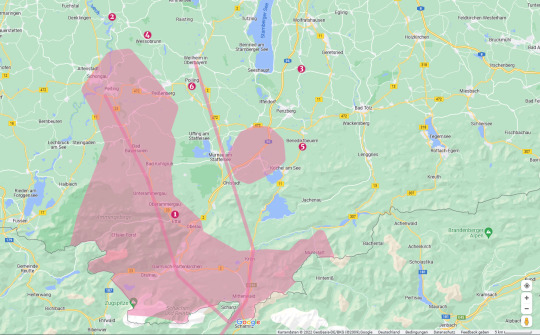
When I first zoned into this map, I got really excited, because there IS a Benedictine monastery on the West road! Kloster Ettal - which is unfortunately mostly famous for a sexual abuse scandal in the Catholic boarding school that's part of the monastery. Yikes.
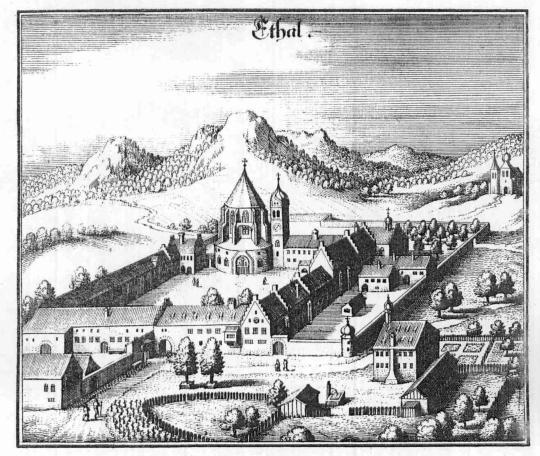
Kloster Ettal (1)
It was founded in the 14th century, so rather late, by Emperor Ludwig IV. The sanctuary features a small marble Madonna. Ettal remained rather unimportant until the 18th century.
Pro: Right next to a Roman road, close to a small river, securely inside my possible location area and located on a hill.
Con: Founded too late and not by a person comparable to the foundress of Kiersau. Not culturally significant before or during the time of Pentiment. No reference to any strange reliquiaries.

Epfach (2)
This is a small village near Denklingen. It's not significant for having a monastery, because there is none. However, Epfach used to be called Abodiacum, and it was located at an important intersection between the Via Claudia and the salt road between Salzburg and Kempten. Since the fall of the Roman Empire, it has lost meaning, and today Epfach is a village with a rich past. The coat of arms depicts a roman lamp with the Chi Rho, emphasizing the merging and mixing of pagan Roman and Christian influences in the area. There have also been several archeological finds, among them the Venus of Epfach, and you can visit a Nymphaeum near the school.
I'm not rating this one pro and con, since Epfach doesn't have a monastery. However, I think the area may have been one of many inspiring places in Upper Bavaria that went into the creation of Tassing. I was especially tickled by the Nymphaeum and the murals that are on exhibit in the former fire station.

Beuerberg (3)
A double monastery, founded around 1120 by a local Noble, Berta von Iringsburg and her sons. It was widely known for its library and school, and it was ravaged by fire several times, which also destroyed parts of the library.
Pro: Founded by a woman, double monastery, a history of fires.
Con: Not a Benedictine monastery, not in the target area, most places burn down over the course of 800 years, and also I literally added it exclusively because my grandparents used to live here.
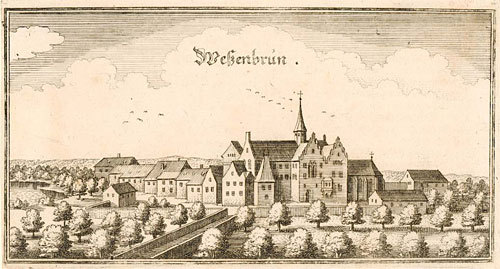
Wessobrunn (4)
Originally founded in 753 by Duke Tassilo III. near another Roman road, it was presumably the proprietary monastery of a family by the name of Wezzo, who according to legend led Tassilo to a spring he had dreamed of. The monastery was pillaged by Hungarians in 955 and rebuilt in 1065. A recluse, Diemut, a famous scribe, worked here after the monastery was rebuilt, although she wasn't part of an order. Wessobrunn became a double monastery in 1130 and burned down in the early 13th century, once again being rebuilt. It became known for its library, and as a local parton of art, especially stucco in the 18th century.
Pro: Double monastery of Benedictines, located on a hill, had a famous female scribe and library, history of destruction by fire. Also, Tassilo could have inspired a place name like Tassing.
Con: Never had a scriptorium, not in the target area, actual story of Tassilo founding it is considered ahistorical by most historians.

Benediktbeuern (5)
Located at the Via Raetia, this monastery was founded once again by Tassilo III. and was gifted, among other things, a salt mine in Tyrolia and several villages. It received an arm reliquiary of St. Benedict in the late 8th century, and head reliquiaries of the martyr Anastasia. Benediktbeuren was a double monastery until the 14th century, with the women's convent located north of the men's convent. Like Wessobrunn, Benediktbeuren was destroyed by Hungarians and rebuilt. Before and after this event, the monastery was home to a famous scriptorium, a famous library and it also had a parish church dedicated to Mary close to the monastery itself. The main part of the monastery was destroyed by a fire in 1490 and then rebuilt.
Pro: Double monastery of Benedictines, famous scriptorium and library, connection to Tassilo, parish church dedicated to Mary, lead by a man called Matthias in the early 16th century, destroyed by fire, a hand reliquary and ownership of a salt mine.
Con: The salt mine was days away, not in the target area, located on a plain.
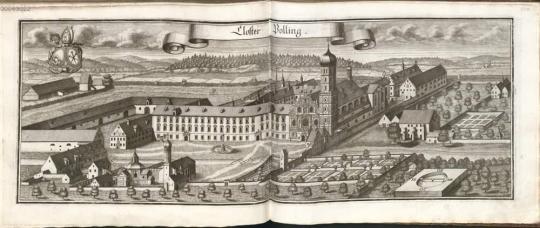
Polling (6)
Founded as a Benedictine monastery in the late 8th century, once again connected to a myth of Duke Tassilo III. In this one, he's hunting and spots a doe that's scratching the ground. Digging up the spot, he finds three crosses and other treasure, and decides to build a monastery there. Polling was also destroyed by Hungarians, and was a a double monastery until 1300, when the nuns moved to Benediktbeuren. Since the early 12th century, Polling was an Augustine monastery and home to an important school. It also had lots of pilgrims coming in for the holy cross.
Pro: Double monastery, located next to one of the Roman roads, parallel name to Tassing and connection to Tassilo, the doe
Con: Not in the target area, not a Benedictine monastery, not known for a scriptorium.
Conclusio
You might ask yourself now, well! What was all that for? And the answer is, of course, to show how realistic and at the same time completely fantastic Kiersau and Tassing are. You can find something of Pentiment's locations in all of the places I've mentioned, and yet none of them are a perfect fit, because the story that Pentiment tells needs the combination of all these things to work.
There's no one place that Tassing mirrors, but I think my favorite find were the many monasteries founded by Tassilo, and the connection of Tassing via the place name - With the people of Tassilo. I love how closely the Roman history of Upper Bavaria, especially Epfach, is picked up, fractured and then condensed in Pentiment. I might write a follow-up on this about the local Pagan practices that we see from Ottilia, Sick Peter and Ursula, but I think I'm a bit too cynical to write about those in a fun way.
Sources:
Etymologies:
Senseless searches on Wikipedia and Wiktionary.
Map of Raetia:
https://de.wikipedia.org/wiki/Raetia#/media/Datei:Droysens_Hist_Handatlas_S17_Germanien.jpg
Roman roads in Germany:
https://www.altwege.de/roemer-und-kelten/interaktive-karte.html (Bernhard Schwade)
Bishoprics in Germany:
https://www.historisches-lexikon-bayerns.de/Lexikon/Bistumsorganisation (map by Sonja Schweiger)
Map of Europe: google babey
History of the monasteries:
https://www.hdbg.eu/kloster/ and a wide array of the monastery websites, Wikipedia and Wikimedia.
Ettal: https://de.wikipedia.org/wiki/Kloster_Ettal#/media/Datei:Ethal_(Merian).jpg
Epfach: https://commons.wikimedia.org/wiki/File:Hirte_mit_Schafen_-_r%C3%B6mische_Plastik_in_Abodiacum_(Epfach),_2020.jpg
Beuerberg: https://bildsuche.digitale-sammlungen.de/index.html?c=viewer&bandnummer=bsb00063022&pimage=678
Wessobrunn: https://bildsuche.digitale-sammlungen.de/index.html?c=viewer&bandnummer=bsb00063022&pimage=644
Benediktbeuern: https://api.digitale-sammlungen.de/iiif/image/v2/bsb10802259_00025/full/full/0/default.jpg
Polling: https://commons.wikimedia.org/wiki/File:Wening_Polling.jpg
360 notes
·
View notes
Text
I'm probably going to regret writing this as I rarely make non-Sims posts and get involved into political stuff, but I just feel I need to get this off my chest as it keeps bugging me more and more as time goes.
You see, I'm Polish and I see myself as a citizen of the global west. Most Polish people do. The thing is, we are too often put into "Eastern Europe" category by European and American journalists and scholars, which is something we don't identify with.
We speak of ourselves as Central Europeans. Unfortunately, you'll often find people on the Internet arguing that there's no such a thing as Central Europe - only Western and Eastern. If you want to go with this duality, then we'd call ourselves Western not Eastern (however the three groups division is better for describing the nations of Europe, imo).
There are also people who acknowlegde the existence of Central Europe but decide we're not that. Guess who is Central European according to them? Austrians! I've seen an article with Austria put into "Central Europe" bin and Poland, Czechia and Slovakia into "Eastern Europe" bin. Has the author seen a map? Czechia is Austria's northern neighbour. Moreover, Czechia, Slovakia and southern part of Poland were parts of Austrain Empire for crying out loud! So why? Because we're Slavic? Are Slavic people always eastern to you?
We argue that we don't feel eastern for many reasons - e.g. we use latin alphabet, our culture is Catholic Christianity based as opposed to Orthodox Christianity, we live literally in the central part of Europe. What we hear in return is that we're different from Germanic nations. Which like, duh, we are, obviously. But I can assure you average Pole is culturally and mentally closer to average German than to average Russian.
We find being called "Eastern European" offensive, frankly. It sounds to us as if somebody told us we are Russians. That's what Eastern Europe means to us - no human rights, violence and poverty. Now, some people in the west say that means we are Russphobic. I don't know, maybe we are. But you'd probably have similar views if generations of your nation had been subjects to Russian regime, be it tsar or USSR. So, naturally, when Russia attacked Ukraine we had great "disappointed but not surprised" mood.
Many of those people who refuse to call us Central Europeans (as if we aren't good enough to be called that) are progressives, which is quite baffling. If you are leftist and accept that e.g. trans people want to be called by correct pronouns and new names (rightfully so), why the hell can't you accept that we don't identify with Eastern Europe? Both matters are about who you are, how you see yourself and how you identify.
Another thing in a similar vein - it's tiring going abroad and hearing all the time "Oh, you're from Russia?" when people hear you speak in a Slavic language. I don't even know Russian language! This kind of behaviour carries the spirit of Pan-Slavism in Russian fashion - all Slavic nations should be united, but once they would be united, they all would become Russians.
ETA: Another thing I wanted to complain about but I forgot (because this post got quite long) is the depiction of Slavs in pop culture, especially Hollywood movies. They often show Slavs as baddies with thick accent, which is probably a remnant of cold war times. So what we usually get is some kind of token Slav (quite often shown as an ignorant violent drunkard) that is a Russian, because they can't tell us apart and most likely don't even care to create diverse Slavic characters. Even if some non-Russian Slavs are introduced in those media, they still carry Russian traits, like the accent which is pretty different for Polish language and Russian language. And those non-Russian Slavs often speak Russian instead of their correct language. Sometimes it gets even worse as they show Hungarians as Slavs. Like what??? Dude, Hungarians are not even Indo-European. Come on, Hollywood! You can do better than that! /End ETA
Maybe the reason for this kind of division is related to the fact that we were on the eastern part of the Iron Curtain. Nevertheless, it's been over 30 years since the Curtain fell. During this time countries of Central Europe have joined NATO and EU. Our economy looks quite different than it had during communism. We've changed mentally too! More than a generation of people have been born after the fall of communism in Poland - some people born in the 90s already have children on their own. That's two generations!
So, please next time when you hear someone speak Slavic language, don't assume they speak Russian, for God's sake! Just ask them if you have to - just like you'd ask a person about their gender.
This is written from my perspective, so it might differ for other Central European Slavs - Czechs, Slovaks. I'm also curious how similar or different are views of Lithuanians, Latvians and Estonians.
As for the Central Europe discourse, I've read an article of Ukrainian journalist, who argued that the war might lead to Ukrainians identifying as Central Europans as well to strengthen the opposition between Ukrainian nation and Russian nation. That's another thing I'm curious of - how common is that opinion among Ukrainians?
Now I leave you be and go back to simming stuff.
34 notes
·
View notes
Text
This is one of my fav maps, it shows population density of Slavs in the world with the biggest populations mainly being in Eastern Europe (naturally, where they originate from) PLUS neighboring countries, but then it's just BOOM, CANADA
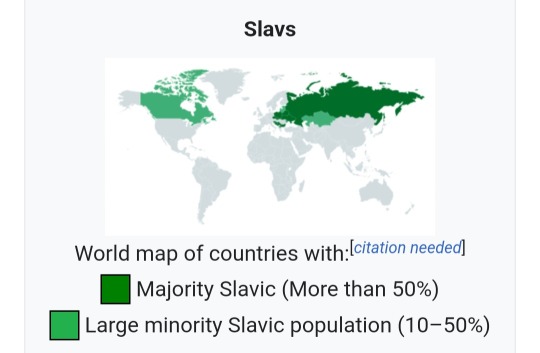
#this is why being mixed Ukrainian (& Algonquian) counts as being Métis bc of the cultural exchange#bc theres so many Slavs in Canada vbsujtffuft#if u go to a government building for say like getting your social security number#one of their main languages offered for service too if u dont speak English is Ukrainian#its right up there with French & German
45 notes
·
View notes
Text
started a new ck3 campaign last night. pagan saxons. specifically started as the "lord" of dithmarschen (roleplaying as a kind of peasant republic). prevented the saxon wars. my mid-term goal is to liberate (conquer) frisia from the franks (want to kinda roleplay creating a hanseatic league analog), but they are still the dominant empire and dwarf us so it will have to wait. in the meantime i am building up my strength by expand eastward, ethnically cleansing the slavs along the way.
somehow i got tangled up in some scandinavian wars and ended up conquering a good chunk of sweden. so i guess i've decided to add a new goal of conquering all of scandinavia. imagine that. a saxon scandinavia. it seems kind of natural though since they (the norse) are the only other germanic pagans on the map right now. may as well unite as a single germanic pagan empire, right?
and on top of that i figured i may as well invade england too. recreate some kind of north sea empire but including saxony too. purify the island of christianity and reunite with our anglo-saxon kin.
#after frisia i want to take northern france#and of course england#to eventually recreate the saxon shore#and ultimately i want to re-germanize and re-paganize all of france
2 notes
·
View notes
Text
This is the quote from Dead Souls Rose attaches to John’s pogo riding shenanigans:
Ah, steeds, steeds, what steeds! Has the whirlwind a home in your manes? Is there a sensitive ear, alert as a flame, in your every fiber? Hearing the familiar song from above, all in one accord you strain your bronze chests and, hooves barely touching the ground, turn into straight lines cleaving the air, and all inspired by God it rushes on!
That seems to be the Bernard Guilbert Guerney translation that Nabokov likes...? Here’s a larger excerpt, this time from the later D.J. Hogarth translation. I’ve bolded the section corresponding to Homestuck’s selection.
And you, Russia of mine—are not you also speeding like a troika* which nought can overtake? Is not the road smoking beneath your wheels, and the bridges thundering as you cross them, and everything being left in the rear, and the spectators, struck with the portent, halting to wonder whether you be not a thunderbolt launched from heaven? What does that awe-inspiring progress of yours foretell? What is the unknown force which lies within your mysterious steeds? Surely the winds themselves must abide in their manes, and every vein in their bodies be an ear stretched to catch the celestial message which bids them, with iron-girded breasts, and hooves which barely touch the earth as they gallop, fly forward on a mission of God? Whither, then, are you speeding, O Russia of mine? Whither? Answer me! But no answer comes—only the weird sound of your collar-bells. Rent into a thousand shreds, the air roars past you, for you are overtaking the whole world, and shall one day force all nations, all empires to stand aside, to give you way!
* troika: cart pulled by three horses
So the selection excises the direct references to Russia on either end... sneaky. It looks like Guerney retains more of the original phrasing, and the breathless vitality with it. I’ll make sure to pick up his version if I get into the text, the bits I read while looking for the quote were quite funny.
11 notes
·
View notes
Photo
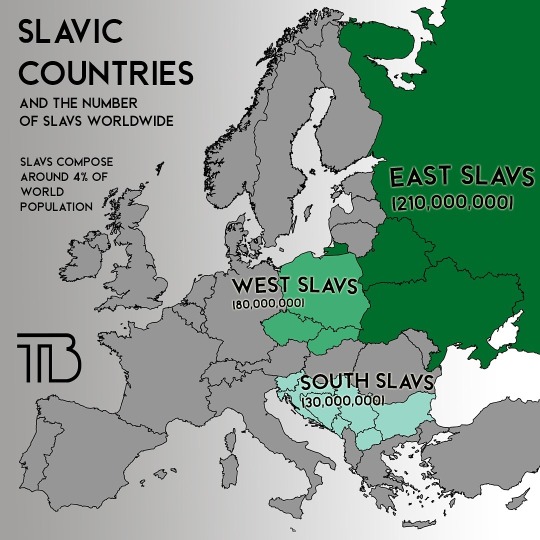
Slavic countries and the number of Slavs worldwide
by try.balkan
108 notes
·
View notes
Text
i feel my heroes of might and magic 3 obsession coming back what a wicked game what if i pour weeks into making a saw inspired story map that nobody will play because the venn diagram of slav that still plays homm3 and saw fan is 2 people aka me and my sister

2 notes
·
View notes
Text
Have no time & no ideas for the arts, so there's a little Informational something about Lucy (my MC)
∘₊✧────────────────✧₊∘
✧ Her height is 5'35 ft (163 cm)
✧ Her b-day is 18th of April; So she's an Aries and her Arcana in "The Moon"
✧ In addition to magic and fortune telling, she studies astronomy, makes maps of constellations, and reads books on the subject. She also has household basics in sewing, cooking and cleaning, the quality of which is average (the process is complicated by her uncoordination and clumsiness)
✧ Shy, taciturn and not particularly talkative; leads, for the most part, a "modest" kind of life. She is often nervous about trifles and it is easy to hurt her. But, still, she still caring, but in her unusual, modest way
✧ Whenever possible, he tries to help everyone, at once and in everything, which is why he is overworked and has trouble sleeping
✧ The marks under her eyes are not just part of her design, but part of her history and essence. They begin to light up faintly when magic "runs through her veins" and shows a magical connection at a particular moment.
✧ Lucy is a Slav, so most of her notes for herself are written in Russian
∘₊✧────────────────✧₊∘
That's all for now. If you interested.. I can make the second post or answer your questions..

I guess I got hyperfixation on my own MC.. THAT'S SO RIDICULOUS-
#the arcana#the arcana game#the arcana a mystic romance#the arcana mc#the arcana oc#mc#oc#facts#oc info
7 notes
·
View notes
Text
It really, really alarms me the way those IDF victory videos insist on referring to bits of Northern Gaza as "Gush Katif".
I'm reminded of how we were told in school about how the Nazis at the height of their conquest came up with various German-sounding names for eastern European capitals.
I remember that our teacher said the words once so we would recognize them & then cautioned us to never use them, because people who do so today are usually of "dubious politics", and any slavs within earshot would "obviously not like that at all".
Or that talk about how they have maps including, like, chunks of lebanon & jordan and that interview with an extreme settler.
It's like those reportages on TV about - not even the disguised covert wannabe modern Nazis, but the in your face oldschool Nazis that make their kids draw maps with austria included and bits of france & poland 'napped.
the comparison just comes immediately to mind, maybe because of my cultural background - maybe if I was east asian I'd be thinking of imperial japan (many Chinese are, according to what I'm reading as of late)
Like anyone who talks that way is plotting murder.
5 notes
·
View notes
Photo

First Bulgarian Empire under Simeon I the Great (893 - 927 CE)
A map illustrating the First Bulgarian Empire at its greatest extent during the reign of Simeon I the Great (the first one to use the title tsar derived from the Latin caesar). The Bulgarian Empire was a medieval kingdom established as a union between the Bulgars and Slavs that adopted Christianity in 864. Simeon I's ambition to ascend to the imperial throne in Constantinople was the dominant driver of Bulgarian foreign policy leading to numerous wars (seemingly, the greatest success was his coronation by the Orthodox Patriarch as "Emperor and Autocrat of all Bulgarians and Romans" outside the walls of Constantinople in 913, although this arrangement did not survive long). At the same time, the disintegration of the Avar Khaganate north of the Danube allowed the country to expand its influence and territory into the Pannonian Plain, which was a mixed blessing as Bulgaria was confronted by the advance of migrating Pechenegs, Cumans, and Magyars.
46 notes
·
View notes
Text
One Man's Fight Against Slavs-Only Apartment Rentals in Moscow
"You have to solve this problem. Otherwise, I will sue, no matter how much it costs me."
By Evan Gershkovich
Feb. 27, 2018
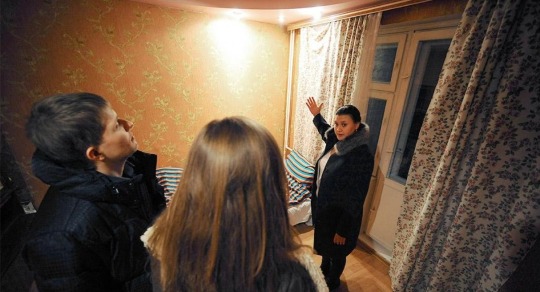
Alexander Ryumin / TASS
The threat was typed in a fit of rage, an emotional outburst that spilled forth after weeks of frustration.
"You have to solve this problem," Emil Allakhverdiev demanded in a viral Facebook post last month. "Otherwise, I will sue, no matter how much it costs me."
Allakhverdiev, 26, was directing his public frustration at Yandex, Avito and the Center for Real Estate Information and Analytics (CIAN), among other Russian apartment rental companies. Hunting online for an apartment in his native Moscow, the English teacher of Azerbaijani descent had run into a ubiquitous fixture: disclaimers that apartments will be rented to ethnic Slavs only.
The practice, aimed squarely at Central Asian immigrants, is one that Russian human rights advocates say has been prevalent in the capital for as long as they can remember. And because it is so entrenched, even Allakhverdiev’s singular Facebook post, they say, represents a step in the right direction.
"It feels like a new moment," Alexander Verkhovsky, the director of the Moscow-based SOVA Center, which tracks nationalism and xenophobia in Russia, told The Moscow Times. "Battling against discrimination requires citizens to be active and lawyers who will litigate strategically and attract media attention."
Although Allakhverdiev has yet to follow through on his threat to sue, he has forced the issue under Russia’s media spotlight. Before speaking to The Moscow Times, he shuttled between appearances on the state-run Moskva 24 channel and the independent Dozhd TV network.
"My primary aim is to bring attention to this problem," he explained in a central Moscow cafe one recent evening.

Emil Allakhverdiev
Facebook
Before setting out on his apartment search three months earlier, Allakhverdiev lived with his mother and rented from a friend. Previously, he hadn’t encountered much racism in Moscow, but the search, he said, had shown him how common it really is.
"It’s not just the disclaimers that you see in one out of every three ads," Allakhverdiev said. "It’s also the real estate agents who, after hearing your last name, just hang up the phone."
In a phone interview, Roman Babichev, who heads the leasing department of the Moscow-based Azbuka Zhilya real estate agency, defended the practice. The goal, he said, is less about keeping apartments in the hands of ethnic Slavs than it is preventing migrant workers from Central Asia and southern Russian republics from turning apartments into "hostels."
"It’s not discrimination," Babichev argued. "People who come from Central Asia, from the Caucasus, from Chechnya and Dagestan" — two predominantly Muslim Russian republics — "will say they will only have three people living in the apartment, but soon 10, 12 people have moved in."
NEWS
Moscow's Most Racist Landlords Revealed
READ MORE
"This is based on years of experience," he added.
Migrant workers from struggling former Soviet republics have long flocked to Russia in search of better wages to send back home. More than a third of Tajikistan’s GDP in 2015, for instance, was earned by workers abroad, 90 percent of which came from Russia. In 2017, authorities estimated that there were about 10 million foreign laborers in the country.
Last spring, Russian researchers at the Robustory data journalism blog found that roughly 16 percent of the ads on CIAN discriminated on the basis of ethnicity or nationality. In their report, the researchers laid out the ads with disclaimers in map form, showing users where it would be easiest to find an apartment.
"This discrimination is not a secret to anyone who lives in Moscow," Vladimir Avetyan, one of Robustory’s researchers, said in a phone interview. "What we wanted to do was to visualize it so that the phenomenon would not just be discussed anecdotally."
Eva Mizrabekyan, 46, was born in Azerbaijan and moved to Moscow in the late ’90s when her Armenian husband found work at a restaurant. In a phone interview, she said she dreaded when the time would come for the couple to find a new apartment.
“My husband is light-skinned, so sometimes we wouldn’t have any problems right away if he went to see the apartment alone,” Mizrabekyan said. “But when it was time to sign the agreement the landlord would find out our name and start cursing and would either try to raise the price or back out altogether.”
“Thank God we found a nice landlord, and for the past seven years we haven’t had to move,” she added.
NEWS
After Metro Blast, Racial Profiling Is on the Rise in Russia
READ MORE
In a statement to Dozhd TV regarding Allakhverdiev’s complaint, CIAN defended the disclaimers on its website.
"Such ads do indeed exist just as, for example, there are disclaimers on ads that say the apartment is ‘only for married couples’ or for those ‘without children’ or ‘without animals,’" the company said. "These disclaimers save our users time."
The company also pointed to Russian law, noting that, while it is clear on employment discrimination, for example, it does not "restrict renters in how they want to manage their private property."
Pavel Chikov, director of the Agora human rights organization, says that the practice is illegal. "The Russian constitution says that you cannot discriminate against people because of their race or ethnicity," he said.
Verkhovsky of the SOVA Center, however, disagrees. Discrimination according to Russian law, he said, is the barring of someone from their rights. "Nowhere in our law," he explained, "does it say that it’s a person’s right to be rented an apartment from another person."
Regardless, to fight the issue, he continued, will require people like Allakhverdiev to demand that discrimination be more thoroughly considered in the courts.
NEWS
Prominent Anti-Racism NGO Sued Under Russian 'Undesirables’ Law
READ MORE
Several days after the interview at the cafe, Allakhverdiev told The Moscow Times that his Facebook post had been removed for containing "open aggression against people on racial, national and religious grounds as well as ethnicity, sexual orientation, gender identity and disability."
The social media platform’s algorithm that removes posts had been hijacked by Russian nationalists sending in complaints, Allakhverdiev suggested. Facebook did not respond to The Moscow Times' requests for comment.
Allakhverdiev also shared screenshots of comments on his original post and messages in his inbox from Russians urging him to leave the country. All of it had made him "want to throw my hands up in the air."
But it wasn't all negative. Others had reached out, too, including some offering him their apartments, and a human rights lawyer who suggested Allakhverdiev file a formal complaint to the Moscow’s prosecutor’s office as an intermediary step before suing. And going to court, Allakhverdiev said, remained an option.
Still, the stream of hate seemed to have taken its toll.
"I am a Russian citizen and Moscow is my home," he said. "Now it doesn’t feel like it so much anymore."
#Old news still a problem#Still a problem#Issues#social issues#racism#russian genocide#indigenous#culture#indigenous russia#indigenous russian#russia#important#colonization#fypシ#fypage#landback#Slavs only#russian imperialism
8 notes
·
View notes